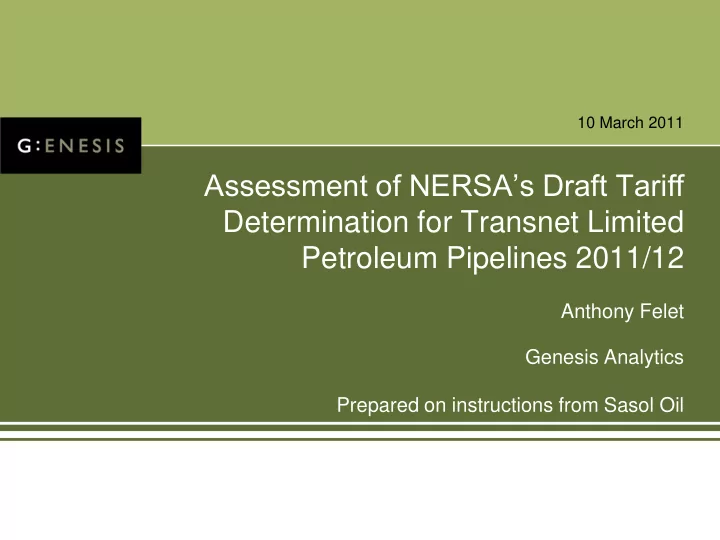

10 March 2011 Assessment of NERSA’s Draft Tariff Determination for Transnet Limited Petroleum Pipelines 2011/12 Anthony Felet Genesis Analytics Prepared on instructions from Sasol Oil
NERSA abandoning sound regulatory principles • FERC (USA) and EU prohibit a rolled-in approach: – Removes potential for future pipeline competition through new entry (due to cross-subsidisation) – Distorts investment decisions i.e. over-building – Creates uncertainty and risk for current captive customers (Natref) and coastal refineries – unrelated extensions/upgrades affect all tariffs • Therefore significant economic cost to opting for rolled- in approach
TPL pipelines should not be regulated as a single system • COP, Avtur, DJP/NMPP/Northern Network are separate: – No operational connections – No need for joint planning – No functional interdependence – COP and DJP/NMPP do not represent “alternative routes” – No fungibility and no opportunity costs to using COP for crude (as claimed by TPL) • Even if TPL’s pipelines were some sort of “system”, this is still no reason to abandon sound regulatory principles: – Disaggregated tariff would be compatible with a “system” – Disaggregated tariff encourages competition through entry which would only happen at individual pipeline level
Inland price impact does not justify approach (1) • Significant impact on inland prices is largely temporary 1.00 Unsmoothed prices 0.90 0.80 0.70 Cents per litre 0.60 FSL RAB reduction No subsidy 0.50 0.40 0.30 0.20 0.10 - 1 6 11 16 21 26 31 36 41 46 51 56 61 66 71 Year
Inland price impact does not justify approach (2) • More favourable alternatives exist where sound regulatory principles are retained 1.00 Smoothed prices 0.90 0.80 0.70 Cents per litre 0.60 Smoothed Unsmoothed 0.50 0.40 0.30 0.20 0.10 - 1 6 11 16 21 26 31 36 41 46 51 56 61 66 71 Year
Scrutiny of TPL application implies lower tariffs • We recommend allowable revenue be reduced by R280m (14% adjustment), through: – Reducing inventory – Reducing Market Risk Premium to 5.5% – Removing 0.15 small company premium from equity beta in recognition of recent and future growth – Applying more efficient 50% gearing assumption – Reducing allocation of corporate overheads to reflect share of direct costs attributable to pipelines business • Reductions in allowable revenue mean lower tariffs and mitigated impact on end consumers
Recommend
More recommend